 |  |
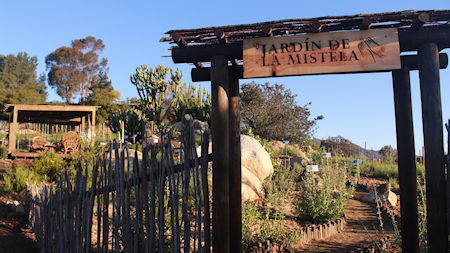
The first people who lived on the Baja peninsula saw plants as sacred. The Kumiai of the north knew the plants nourished and healed them. This ancient knowledge was passed to the young, who learned. Six hundred generations have brought their wisdom forward. As these elders die, so dies this knowledge and reverence. Thankfully there are still a few wise ones with a passion to save and share this knowledge. Paula Pijoan is one who hears the calling. She invites you to Vinos Pijoan in the Guadalupe Valley to walk with her through the Jardín de Mistela.
Paula has lived her whole life in Ensenada. She was once an avid surfer until the plants and the great golden oaks beckoned her inland. She was drawn to the peace of the forest and became a Shinrin-Yoku practitioner, known simply in the West as Forest Bathing. She guides people to “take in the forest atmosphere.” She explains, “The forest is the therapist and the guide opens the doors.”
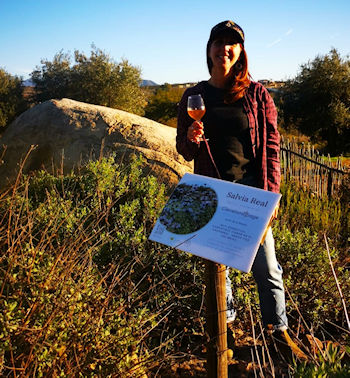
For many years she had a vision. While the Vinos Pijoan winery is her family’s business, she sees her legacy in a very different way. Called by nature to discover her true purpose, it eventually matured into her own personal vision. She has created Jardín de Mistela as a community service to educate people on how important the unseen native plants are to a healthy ecosystem.
This tiny botanical garden on the way to El Porvenir will connect the visitor to Baja California in a very different way. Through taste and fragrance, we are informed of a much broader spectrum of experiences than we might be used to. “I care so much about this topic. When people understand, it is possible to make the correct decisions on how to care for their land, the plants and forests,” She stated, “I lead workshops, but I can’t teach every single person, so I saw this garden was as a way to teach more people.” She found that once she committed to the project requiring an expanse of time and money people appeared to help support her vision. She grins when she says that she learned you have to take the first step and commit to what you love, then the vision begins to unfold and the help you need will appear. She laughs, “I’m still learning this.” For her it was a deeply fulfilling experience of completion and she inaugurated the Jardín de Mistela with a festival. She was thrilled when 200 people came to enjoy an afternoon in the vineyard communing with the plants and sipping the mistela elixir.
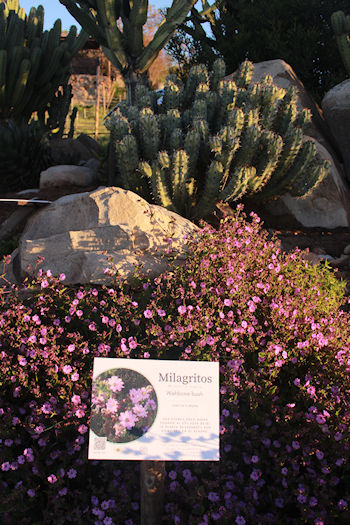
A fresh breeze moves the leaves of the trees and ravens fly overhead laughing at us earthbound people as Paula explained that mistela is a sweet aperitif. It was a drink originally from the Catalonia city of Barcelona and made from unfermented grape juice to which they added alcohol so it didn’t ferment. Mistela is sweet because of the natural sugar from the grape. “To this we added 15 types of botanicals, most of them native plants. Very few people know the native plants, so I thought to add the familiar Mediterranean plants like rosemary and lavender. My intention for this garden was to create something for the visitor who usually just comes to drink wine. I want to invite them down into the garden with a glass of mistela. The plants in the garden are very aromatic and they are the ones that are extracted and infused into the alcohol and grape juice.”
Paula invites a little walk. She bends down and pinches a leaf. “I invite people do this so they can smell the leaf and then sip the mistela.” She talks to each plant as if they were little people with a volition to survive, but of course they have survived for tens of thousands of years. However, development threatens them. She points out the wild white sage. It expresses itself in very healthy clumps of soft velvety white leaves and the fragrance is most definitely forward in the mistela. She offers, “There are many other species of sage you might overlook, if you don’t stop and pinch a leaf. The fragrance is definitely sage, but as you taste and pinch a leaf you can detect the subtle differences from each plant species. And in this way, you can meet the plant that contributes its fragrance to what you are drinking, refining your palate.” Artful signs post names and informs you taking you to a website for more information. In this way you can meet the plant that contributes its fragrance to what you are drinking. I mentioned that I thought this was a unique kind of pairing.
Paula’s passion becomes clear as we move deeper into the garden. The depth of her knowledge, is inspiring. “A further intention was to make a bridge between wine drinking and the ecosystem. My objective is to teach people that you can’t have a valley that produces wine by only planting vineyards. You need a whole ecosystem that is functional which includes the native plants, healthy soil, and nature to produce good wine. Birds and native bees are very important. Nature is healthy when there is biodiversity. Not just the honey bee, actually there are 500 different native species of bees. These bees do not produce honey that we can use, therefore they don’t get much of our attention. But they are vital to wine production.”
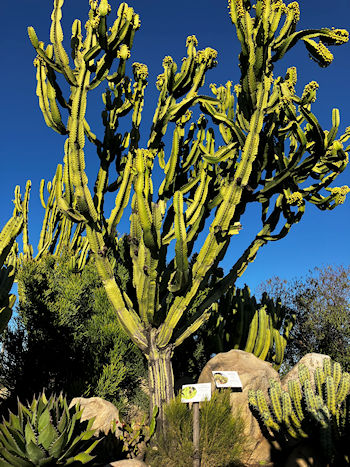
Another very important issue in producing good wine is whether to use pesticides to kill marauding insects. Most people don’t even think about insects unless they are being bothered. There are both good insects and harmful ones. But when pesticides are used it kills everything. “To cut the use of pesticides you protect the native plants where the beneficial insects live. They will kill the raider-insects that attack the vines if the ecosystem is in jeopardy.” She goes on to say that there are other reasons for protecting the natural plants. “Native plants are rooted deep in the soil, so when it rains, the water trickles down into the aquafers.” She relates that the developers have no knowledge of this. The old method is still used. The land is scraped of all living things in order to prepare it for sale. The top soil is lost which creates erosion so when it rains, the precious water runs off into the sea. Paula admits this is extremely difficult for her to witness. “It is called limpio and nothing will ever grow there again.”
Paula has a couple of surprises waiting. “People think what they see are cactus, but actually they aren’t.” She points out an immense looking “cactus” and she grins saying, “That is not a cactus. It is actually from the Euphorbia family which is a massive family of many kinds of plants.” Then she gave the punch line, “It is the same family as the poinsettia.” No! Unbelievable!
Paula laughed and went on, “You can tell the Euphorbia family because when cut they ooze a milky white sap. You will never find a cactus that does that.” Paula said that she planted the now giant Euphorbia in her cacti island twenty years ago, before she knew what she was doing. The Jardín de Mistela now holds a wealth of her knowledge.
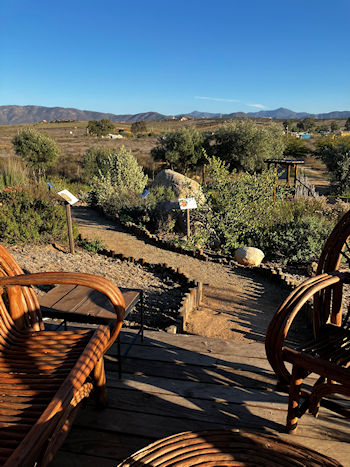
Paula’s good work has paid off in a very big way. The Banyon Tree luxury resort contacted her in 2018 to guide them on how to protect the native plants and surrounding area. This luxury resort has a signature of privacy and comfort and is known to be in the top 25 hotel brands in the World. Banyan Tree Veya Valle de Guadalupe put her on a fast track of learning. Now it is very close to completion and is due to open in May of 2024. She said, “They have given incredible effort in conservation. The developers put a high priority and importance on featuring the native plants. A project of that scale vetted on native plants will help in making more people aware of the importance of the ecosystem in their own communities. It will bring full attention the Native Plant movement.”
Paula invites you to visit Vinos Pijoan anytime for a self-guided walk. She offers the Jardín de Mistela Festivals to interested groups. You can contact her directly for Forest Bathing. One thing for sure, Paula is creating revolutionary thinking in Baja California. She has come a long way in the last 5 years. Her passion has created a very powerful voice for the future. As she said, “Commitment is the first step.”
To contact Paula:
Email: Paulapijoan(at)gmail.com
Forest Bathing: respirabosque(at)gmail.com
Vinos Pijoan
Phone: 646.127.1251
Related articles:
Forest Bathing
A Hundred Years of Soul Surfing

Easy to use and good peace of mind.

Took just a few minutes on line. Easy even for a 75 year old

This is my second year purchasing insurance through Baja Bound. It’s a pretty painless...